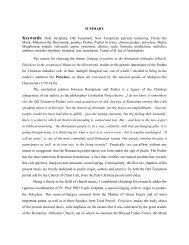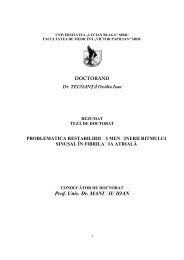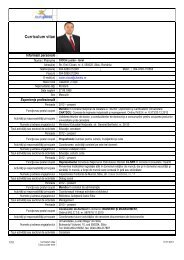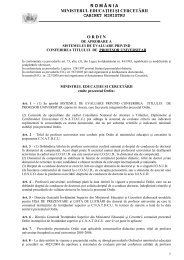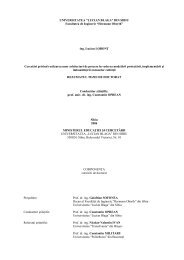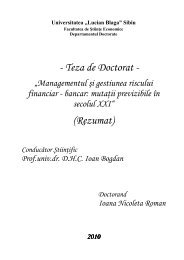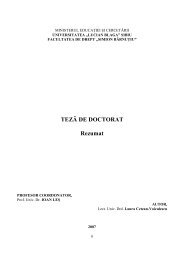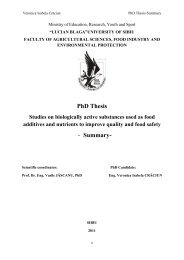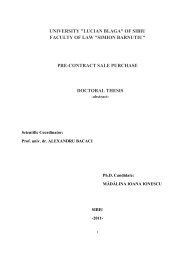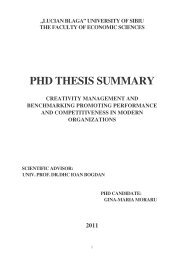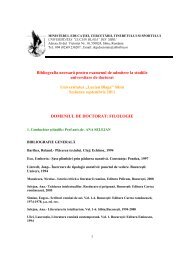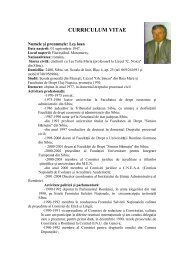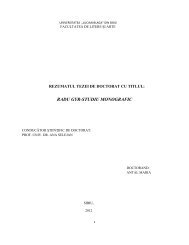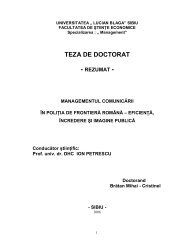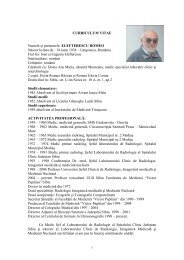names began to emerge: Nicolae Breban, Alexandru Ivasiuc, Constantin Ţoiu, GeorgeBălăiţă, Augustin Buzura, Petre Sălcudeanu. Seizing the moment, these either birtheda literature of justice which, by exposing the errors of the communist past aimed atfostering some uncomfortable aspects of Ceausescu’s regime, or steered theircreations towards a fiction which thrived on fantastic and dream-like elements, onmyths and symbols, the defining features of anti-realistic and anti-mimetic literature.The stimulating climate of creation was to be disturbed, though, by thepublication of the July theses in 1971, which threw an anathema on all artistic creationthat moved away from the realities of “socialist construction” or displayed interest inany element that could be linked to the “bourgeois or decadent lifestyle” of the West.These requirements, backed by a censure which, although officially dissolved, wasgrowingly harsh, did not manage to determine the 1960s writers renounce thepublication of perfectly valid works of fiction. They perfected the strategies throughwhich the forms and contents imposed by the authorities were eluded and practicallycontinued the directions of the second half of the 1960s, avoi<strong>din</strong>g the officialrequirements and preserving the core of literature, refusing to accept the theoreticalstatus which literature came back to in 1971: that of a propagandistic weapon.The second chapter of the thesis, Exterior Instances of the Literary NarrativeText, represents the logical sequel of the previous chapter as it analyses, in separatesubchapters, the concepts of “concrete author”, “abstract author”, “concrete reader”,“abstract reader”, all of them essential in dealing with how a work of fiction movesfrom a historically engaged concrete author to a historically engaged concrete reader.Bringing to discussion the theory of the multiple self in psychology, which underlinesthe coexistence and importance of several selves (the authentic self, the social self, theideal self, the reflected self, the actual self), and the concept of “ketman” introducedby Czeslaw Milosz with direct reference to life under totalitarian regimes, the presentthesis lays emphasis on the coexistence of the individual’s authentic self (leftunaffected by the environment) with a superficial self (a mask, a protection). Theinherent duplicity in the context of “the global prison” of communism, the assumptionof a certain behaviour which would be socially desirable became even morecomplicated, in the case of these writers, as they were insidiously lured by the need ofbelonging to a group, the financial security and advantages regular citizens would nothave access to.8
Under these circumstances, in the subchapter entitled The Histrionic Ivasiucwe have referred to the concrete author Ivasiuc. Alexandru Ivasiuc was born on July12, 1933, at Sighetu Marmatiei, Maramureş county, originating maternally in a familyof traditional Maramureş aristocrats and paternally having Bukovinian roots. Afterfinishing the high school of Sighet, starting from 1951 he attended the courses of theFaculty of Philosophy of Bucharest, being expelled after two years for ideologicalreasons. After working for a short time as an under-plumber on a site in order to be reeducated,in 1953 he enrolled for the courses of the Faculty of Medicine within theMedico-Pharmaceutical Institute of Bucharest, being expelled three years later andarrested for his participation in the movements of the students in Bucharest, as a signof solidarity with the Hungarian revolution. Judged in the group bearing his name, hewas sentenced to five years’ imprisonment, executed in the prisons of Jilava, Gherlaand in the forced labour camps of Periprava, Stoeneşti and Salcia. After being set freein 1961, he got further on a compulsory residence in the village Rubla-Calamăţui ofBrăila county. Coming back to Bucharest in 1963, he was employed first as a chemistworker at Sintofarm, and then as an office worker at the Embassy of the United Statesin Bucharest.Ivasiuc began his activity as a writer on July 9, 1964 with the short storyentitled Timbrul, published in Revista literară, then he contributed to newspapers likeContemporanul, România literară, Viaţa Românească, Luceafărul etc. Until 1977,when he died under the walls of the Scala buil<strong>din</strong>g in Bucharest, during theearthquake of March 4, he had published seven novels: Vestibul (1967), Interval(1968), Cunoaştere de noapte (1969), Păsările (1970), Apa (1973), Iluminări (1975)Racul (1976), a volume of short stories: Corn de vânătoare (1972) and an importantnumber of essays issued in the Romania literară (from 1969 to 1976, with the hea<strong>din</strong>gPro domo), subsequently put together into two volumes: Radicalitate şi valoare(1972) and Pro domo (1974).After presenting a short biography of this prose writer, we have insisted onthe elements that led to his being considered an ally or a protégé of the politicalpower, but also on those aspects representing a counter-weight. The blame of being “afriend of the regime” started first of all from the political attachment Ivasiuc wouldhave shown by joining the Romanian Communist Party in August 1968, after thesurprisingly critical speech made by Ceausescu after the invasion of Czechoslovakiaby the Russians. Suspicions that appeared were generated by the important prizes he9
- Page 2 and 3: TABLE OF CONTENTSINTRODUCTION .....
- Page 4 and 5: SUMMARYThe doctoral thesis Narrativ
- Page 6 and 7: politics in Romania revealed the au
- Page 10 and 11: was awarded (two prizes of the Writ
- Page 12 and 13: with the text through the opinions
- Page 14 and 15: integrate elements involving both n
- Page 16 and 17: omniscience, from the discourse cha
- Page 18 and 19: “zero degree narratee”, any dev
- Page 20 and 21: the two main directions existing in
- Page 22 and 23: portrayal, but one based on signifi
- Page 24 and 25: What the characters discover after
- Page 26 and 27: The analysis on the character also
- Page 28 and 29: internal, the focalized can be perc
- Page 30 and 31: Koppe 37 , that the relation focali
- Page 32 and 33: epresented by a proliferation of an
- Page 34 and 35: BIBLIOGRAPHYI. OPERA LUI ALEXANDRU
- Page 36 and 37: 6. Popescu-Neveanu, Paul, Dicţiona
- Page 39 and 40: 45. Neagu, Fănuş, Cartea cu priet
- Page 41 and 42: 21. Călinescu, George, Scriitori s
- Page 43 and 44: 60. Iser, Wolfgang, The Implied Rea
- Page 45 and 46: 98. Pârvulescu, Ioana, Prejudecă
- Page 47 and 48: 140. Selejan, Ana, Literatura româ
- Page 49 and 50: 14. Dimisianu, Gabriel, USR sau SSR
- Page 51 and 52: 3. Blandiana, Ana, Scriitorul şi P
- Page 53 and 54: 25. Pier, John, La narratologie all



